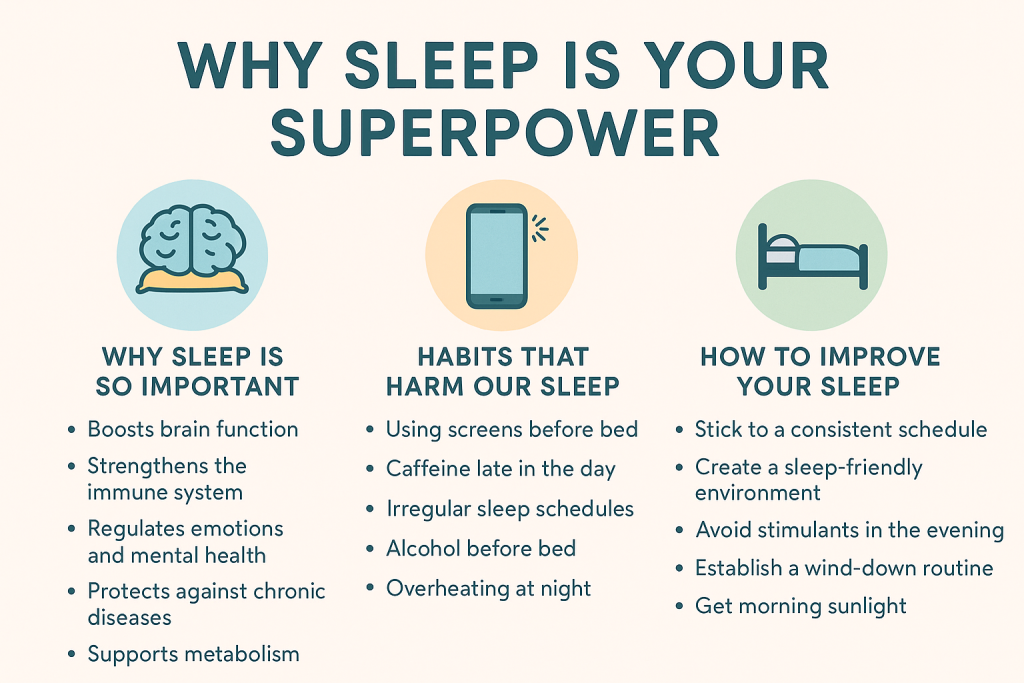Why Sleep Is Your Superpower
Insights from “Why We Sleep” by Matthew Walker
Sleep is not a luxury – it is a vital necessity. In his groundbreaking book Why We Sleep, neuroscientist and sleep expert Matthew Walker reveals just how essential quality sleep is for every aspect of our physical and mental health. In fact, he’s explaining extremely well why sleep is your superpower.
After reading the book, I’ve started to truly appreciate just how precious a good night’s rest really is. It made me look at my own habits with fresh eyes and inspired me to take better care of my sleep. I even treated myself to a Garmin smartwatch so I could track and understand my own sleep patterns – because once you realise how much sleep shapes your life, you can’t help but want to nurture it.
Let’s explore the key takeaways in three parts:
1. Why Sleep Is So Critically Important – 5 Key Reasons
-
Boosts Brain Function
Sleep plays a crucial role in enhancing learning, memory consolidation, creativity, and decision-making. During deep sleep, your brain processes information and clears out waste. -
Strengthens the Immune System
Sleep helps the body produce infection-fighting cells and antibodies. A lack of sleep makes us more vulnerable to illnesses. -
Regulates Emotions and Mental Health
REM sleep helps manage emotional reactions. Poor sleep is strongly linked to anxiety, depression, and emotional instability. -
Protects Against Chronic Diseases
Insufficient sleep increases the risk of heart disease, diabetes, stroke, and even Alzheimer’s disease. -
Supports Metabolism and Weight Control
Sleep regulates hormones like leptin and ghrelin, which influence hunger and appetite. People who are sleep-deprived tend to eat more and gain weight.
2. Habits That Sabotage Our Sleep – 5 Common Mistakes
-
Using Screens Before Bed
Blue light from phones, tablets, and TVs suppresses melatonin, the hormone that signals sleep. -
Caffeine Late in the Day
Caffeine blocks adenosine, a chemical that builds up sleep pressure. Even an afternoon coffee can disrupt your night. -
Irregular Sleep Schedules
Going to bed and waking up at inconsistent times confuses the body’s internal clock, making it harder to fall asleep and wake up refreshed. -
Alcohol Before Bed
While it may feel relaxing, alcohol disrupts REM sleep and leads to poor sleep quality and frequent awakenings. -
Overheating at Night
A warm environment or heavy bedding can prevent your core temperature from dropping, which is necessary for deep sleep.
3. How to Improve Your Sleep – 5 Science-Backed Tips
-
Stick to a Consistent Schedule
Go to bed and wake up at the same time every day, even on weekends. This strengthens your circadian rhythm. -
Create a Sleep-Friendly Environment
Keep your bedroom dark, quiet, and cool (around 18°C / 65°F). Use blackout curtains and remove electronic distractions. -
Avoid Stimulants in the Evening
Reduce or eliminate caffeine and nicotine after 2 p.m. and skip alcohol before bed. -
Establish a Wind-Down Routine
Give your brain a cue to slow down – dim the lights, read a physical book, take a warm bath, or try light stretching or meditation. -
Get Morning Sunlight
Natural daylight in the morning helps reset your internal clock and improves sleep quality at night
Final Thought
Sleep is the foundation of your mental sharpness, emotional stability, and physical health.
As Walker says, “The shorter your sleep, the shorter your life.” Treat your sleep as a priority, not a leftover—your body and brain will thank you.
Stay happy,
Magda.

PS: A big reason I write is to meet people so feel free to say Hi! on LinkedIn here or follow my Instagram here, as I’d love to learn more about you.
Sign up for my newsletter!
Please check your Spam folder or Promotions Tab for a sign-up confirmation email. You will only be subscribed after you click the confirmation link in that email message. Thank you!





